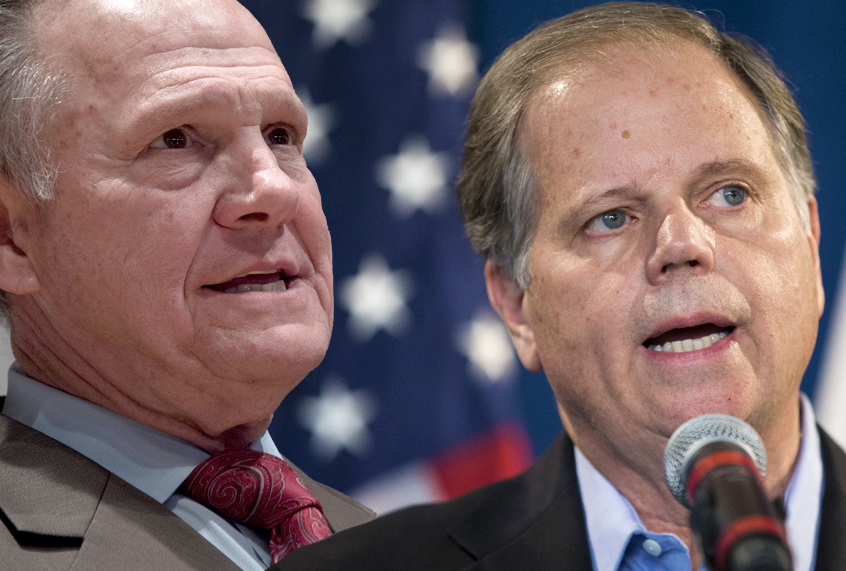For many months, officials of the social media companies have paraded before congressional critics angry over the venal use of fake identities and pages to use the platforms in efforts to unduly influence elections.
During virtually all of those instances, the lean was towards helping Republican candidates, with help from Russians and others in campaigns to help candidate Donald Trump. The march of alleged dirty tricks also have taken in state and congressional elections in Georgia, North Carolina and other districts, again always favoring Republican candidates.
Now, inevitably, comes news that in Alabama, it was a group of Democrats who seem to have used the same techniques — weirdly, as it turns out — in an effort to turn voters against Republican candidate Roy S. Moore in the 2017 Alabama Senate race.
There were a series of Facebook pages and tweets issued by a group posing as teetotalling Baptists pushing an odd driving-while-driving theme. Somehow, the group, which in real life were progressive Democrats who were out to defeat Moore, thought that associating Moore with calls for a statewide ban on alcohol would hurt him with some Republicans, and help Democrat Doug Jones, who won just narrowly.
The story of all this in The New York Times is just as disgusting as the pro-Republican efforts that have preceded it.
In social media posts illustrated with car wrecks and videos of families devastated by alcohol, the idea was that the state should ban alcoholic beverages. The Dry Alabama campaign came in the last two weeks of the election.
The Times quoted Matt Osborne, a veteran progressive activist who worked on the project, who said he hoped that such deceptive tactics would someday be banned from American politics. But in the meantime, he said, he believes that Republicans are using such trickery and that Democrats cannot unilaterally give it up.
“If you don’t do it, you’re fighting with one hand tied behind your back,” said Osborne, a writer and consultant. “You have a moral imperative to do this — to do whatever it takes.”
Dry Alabama actually was the second “false flag operation” by Democrats in the fiercely contested Alabama race, underscoring how dirty tricks on social media are creeping into American politics. The Times reported last month on a separate project that made it appear as if he enjoyed Russian support.
As described, the project was run in part by a cybersecurity company called New Knowledge. Upon the issue being made public, Facebook shut down five accounts that it said had violated its rules, and Senator Jones to call for a federal investigation. There is no evidence that Jones encouraged or knew of either of the deceptive social media projects.
According to the Times, some Democrats were discomfited by the revelation that the first Alabama effort had been devised to try out the tactics of the Russian operation. Rather than Russians working in St. Petersburg posing as Americans, this time Democrat pretended to be conservative state residents. It was financed by Reid Hoffman, the billionaire co-founder of LinkedIn, who apologized and said he had been unaware of the project and did not approve of the underhanded methods. The second was funded by two Virginia donors who wanted to defeat Moore, according to an unnamed participant. The two projects each received $100,000, funneled in both cases through the same organization: Investing in Us, which finances political operations in support of progressive causes. Dmitri Mehlhorn, the group’s managing partner, declined to comment on whether he approved of the tactics.
Mehlhorn acknowledged, in a post on the online forum Medium, a “concern that our tactics might cause us to become like those we are fighting.” He declared that “some tactics are beyond the pale.” Another organizer, according to two participants, was Evan Coren, a progressive activist who works for the National Archives unit that handles classified documents. He did not respond to requests for comment.
But there is no doubt that the progressive Democrats who created the now-defunct Facebook pages — and the related Twitter feeds, seeming afterthoughts with negligible reach — were trying to deceive voters about their identities and real views. Facebook’s community standards, which were tightened in 2018, emphasize “authenticity” and prohibit “misrepresentation,” including coordinated efforts to “mislead people about the origin of content.”
Can’t we just agree that political social media trickery of this sort is just a no-no, regardless of party? Do we need laws that say so?
At least two more social media operations intended to help Jones were run by small companies called Tovo Labs and Dialectica. Neither responded to queries about their tactics. A public account by Tovo Labs of its effort described setting up websites for Christian conservatives and moderate conservatives but claimed all the content was “legitimate material” and its methods “ethical.” A pitch to potential customers from Dialectica offers “a new generation of information weapons” to battle “fake news,” and a marketing email shared with The Times says the company worked in the Alabama race’s “meme war” for at least three months.
Given Jones’s slender margin of victory — about 22,000 votes, out of more than 1.3 million — it is hard to say for sure that Dry Alabama had no impact. But many other independent efforts were at play on both sides, and the amount spent on the two false flag projects was relatively tiny in a race that cost at least $51 million, including the primaries.
It’s all disgusting.


